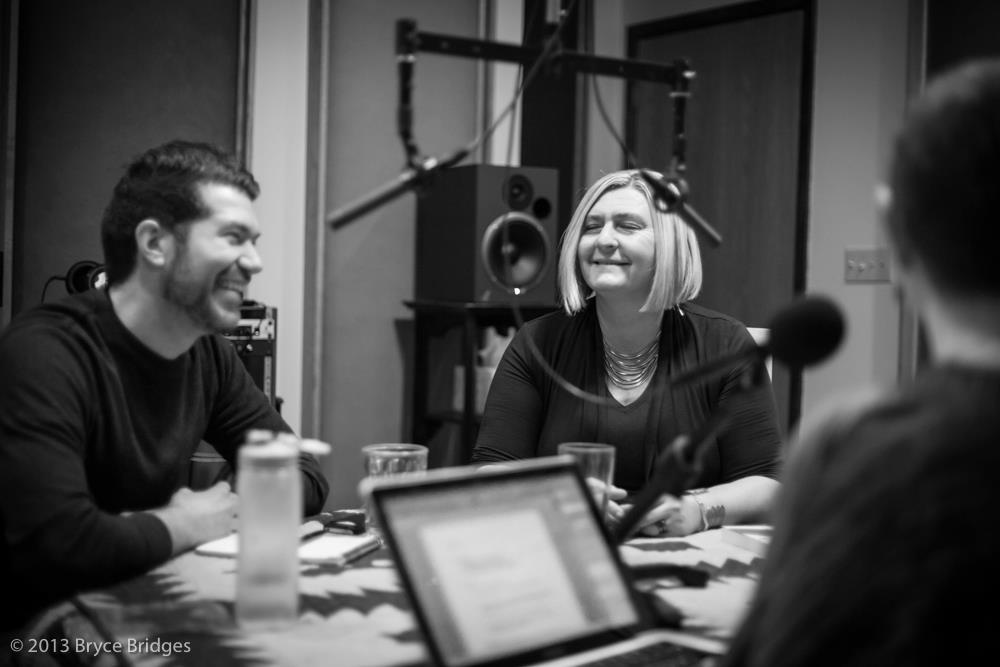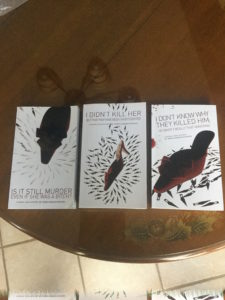April 3rd, 2019 → 6:55 pm @ rldonovan
How old are you and where are you from?
My first book came out in 2010 and the menopausal protagonist, Donna Leigh, was patterned after me. I was in the early days of menopause back then.
I was born in Jersey City, NJ, so in many ways the dye was cast. At a young age I moved to Connecticut and experienced a very different culture – it was a remarkably broadening experience. Today, I live in Omaha, NE and the merging of these three very different cultures is what enables me to build multi-dimensional characters and when I do create characters that are two-dimensional, it’s deliberate. I’ve recently added a ski home in Utah – more grist for the mill.

Tell us more about your book!
My Donna Leigh Mystery series (with three books) features the menopausal owner of an Omaha ad agency, Donna Leigh. In each book, someone from Donna Leigh’s world has been murdered – and in each case her connection to the victim propels her into the investigation. Donna Leigh has enabled me to address all of the pet peeves I have collected in years of reading cozy mysteries. I work hard to eliminate red herrings as well as other painfully stereotypical cozy mystery devices, i.e. when a disguised voice phones to invite Donna to a remote area, late at night and alone in order to obtain a lead – she let’s loose a torrant of anger as she explains that she was not born yesterday and she will never fall for that ploy. Donna Leigh is a smart and attractive woman who is not perfect. She’s not twenty-something, skinny, flawless and brilliant – she has her flaws – but they don’t keep her from being awesome, and funny.
You’re sharing an elevator with a big name publisher. Pitch your book using 20 words or less!
Do you want to give readers an Evanovich-like laugh and a legitimate mystery to solve? Let’s talk.
What does your writing space look like?
In the winter, I like to be sitting at a huge window, looking out at a majestic mountain with a glass of white wine in my hand and my laptop on my lap. In the summer, I typically start out on the couch in my family room and switch to the table on my deck as the day warms. I add the white wine at 5 pm.
If your book was turned into a movie, who would play your main characters?
I think Bette Midler would crush the role of Donna Leigh. And once you have Bette, nothing else really matters. Nevertheless, I think my first murder victim, Claire Dockens would ideally be played by Julia Child – unfortunately, she’s not available – but she would have been perfect! Paris Hilton would make an awesome Clovis Cordoba Seville, that built in narcissism would be an ideal enhancement to her performance. Pam Ferris and Felicity Kendal from the British TV murder series Rosemary and Thyme would make an excellent Peg and Babs.
You’re stranded on an island, and only one character from any book can save you. Who are you picking?
I would want to be stranded with Clovis Cordoba Seville. Despite her incredibly annoying personality, there is nothing like extreme narcissim to get your demands met, and without an adoring audience, Clovis would not stick around on any island.
Besides being a writer, what else do you enjoy?
Well, reading, naturally. I also love my bulldogs (English and French), dancing, skiing and wine dinners with friends. I do enjoy working at my ad agency, Bozell, but that’s work.
I would want to be stranded with Clovis Cordoba Seville. Despite her incredibly annoying
Follow Robin on social media!
Facebook Author page: RL Donovan
Series page: Donna Leigh Mysteries
Check out her mystery series, available no on amazon!
February 25th, 2019 → 6:53 pm @ rldonovan
My Donna Leigh Mystery series revolves around a menopausal ad agency owner in Omaha, Nebraska. Although each book encompasses the murder of someone known to the protagonist, the books are actually comedies. With three books in the series, the challenges have been in finding credible enough yet over-the-top comedic events, without an over-abundance of similarity, and in keeping the plot fresh enough overall that the books don’t start to feel formulaic.
Evanovich’s protagonist, Stephanie Plum, pretty much always sets a car on fire, it’s her signature comedic move. Perhaps I should have set a precedent like that, because creating new and outrageous scenarios is increasingly a challenge.
Each book requires approximately six comedic events to keep things moving at a fast pace. I realized this would be a daunting task as early as my second book, and the third book was that much more intimidating.
Along those same lines, it is a genuine challenge to keep my plots from becoming formulaic. The same characters want to say and do the same things. It is imperative to find ways to pull them out of their comfort zone without pulling them out of character.
Folks have suggested that I move on from Donna Leigh and start a whole new series, but my gut is telling me to stick with her for at least another book or two. And if I’ve learned one thing in this whole experience, it’s to trust my gut.

September 10th, 2018 → 9:35 pm @ rldonovan
J.E. Feldman’s Exploits
https://dragonqueen3.wordpress.com/2018/09/10/author-interview-with-r-l-donovan/

January 28th, 2013 → 9:55 pm @ rldonovan
We’ve already addressed three of the four basic categories that new authors tend to fall into: the I have an idea I’d like to share with the world group, typically consisting of business advice – an idea, the I have a story to tell group, often about overcoming adversity, and/or self-help advice and the I want to write a book and give my business, or personal brand, a boost folks. We’ve given these author-types some advice on the best way to get things started.
That leaves our fourth and final category, consisting of the I love to write and I’m pretty good so I should probably write a book folks. For them the subject of the book is often secondary to their desire or even need to express themselves in writing.
At the risk of seeming immodest, that’s where I place myself. As an English major and a former English teacher, I have always wanted to write a book and I’ve never been shy about sharing that fact. When I finally got around to actually writing a manuscript there were those who asked “why did you wait so long?” And the answer is simple. I envisioned pouring my heart into my life’s work and spending the next decade receiving one rejection after another from heartless publishers who would ignore and overlook my brilliance, thus shredding my very soul.
Getting to know a publisher gave me the courage to take a shot. Once I’d made the decision to finally write the damn thing – I hadn’t a clue of what to write. A chat with this publisher helped to get me focused.
“What do you love?” he asked.
“I love comedy.”
“Then write your comedy and show it to me,” he suggested.
That was it. Next challenge – decide what funny things to write about. As a lifelong aficionado of murder mysteries – both serious and comedic – the old adage “write what you know” seemed applicable.
Once my genre was set I sat down to write. The first three chapters virtually wrote themselves. I packaged these up and sent them to my “publisher acquaintance” to await his verdict.
A few weeks later confirmation arrived. My chapters were of enough interest to warrant finishing the book. It was a bittersweet moment that juxtaposed the thrill of having a publisher’s interest and the terror of being clueless as to how to write a whole book.
For me, the next step was to continue writing while simultaneously creating a writing process. There are some who would say my journey appears to have been backwards. But it’s what worked for me.
Here are a few pointers for those of you raring to go:
Donovan heads Bozell Books, a division of Bozell designed to help authors and budding authors from inception through promotion of their published work. She has authored a novel entitled: Is It Still Murder Even If She Was a Bitch? www.rldonovan.com, and the second in her Donna Leigh Mysteries series is currently being published. Her next installment of FAQs on Authoring a Book will address the prospective author with confidence in their ability to write and how it impacts their process of “Getting Started.”
December 20th, 2012 → 8:44 pm @ rldonovan
The origin of Bozell Books and Managing New Author Expectations:
The Bozell Books division was started as a direct result of my own personal need. I had just published my first book: Is It Still Murder Even If She Was A Bitch?, and I hadn’t a clue as to how to promote it. www.rldonovan.com.
I learned through glimpses of more experienced authors that promoting a book in this day and age takes an Herculean effort. I hasten to add that it has been something I’ve wanted to do for as long as I can remember – and it has absolutely been one of the most rewarding experiences of my life! I wouldn’t trade it for anything!
Promoting a book seemed so easy based on all the movies and TV shows depicting authors and their exciting careers. From my vantage point things looked dramatically different. In the movies and in TV, once your book is published you just sit back and let the world gather at your feet. Your publisher sets up reading/signing/speaking engagements and provides a stretch limo (complete with chilled champagne) to convey you from one glamorous event to the next.
Reality bore little resemblance to the glamour of fiction as the promotion of my book began. I felt extremely fortunate to have worked closely with an established author of Harlequin Romance novels before undertaking my own career as a novelist. At last count she has written and published 17 books and her painstaking experience in trying to promote them has helped to manage my own expectations.
I find that the most difficult part of helping a budding author is in trying to manage their expectations. There is at least a little part of all of us (myself included) that thinks “that’s you, but my work will be received differently.” It can happen, but it’s pretty rare.
The most difficult part of managing new author expectations is in getting the point across without going so far that it kills motivation. It’s a finely balanced art.
As challenging as it is to promote a book, the thrill of getting out into the public and sharing your work with new audiences is a rush like no other. A relative recently asked me in a somewhat sardonic tone “so, do you get the star treatment?” The first thought that flitted through my head was the backbreaking amount of work I was doing to promote the book; but my second thought took me right to that place where I’m in front of an audience comprised of folks that want to know any number of things about me and my book. “Yes,” I answered in all honesty, “there are times when I really do.”
Donovan heads Bozell Books, a division of Bozell designed to help authors and budding authors from inception through promotion of their published work. Her next installment of FAQs on Authoring a Book will address the age old challenge of “Getting Started.”